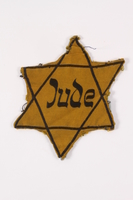Overview
- Description
- Documents, photographs, and correspondence illustrating the experiences of Edith Löw who was born in Vienna, Austria in 1926 and remained there throughout the Holocaust. Collection includes correspondence received by Edith Löw from her mother who was deported to Theresienstadt as well as from friends that were also deported and corresponded with her. Documents include her identification papers while working in the Jewish community and pre-war report cards and documentation. Also included are documents illustrating the experiences of Friedrich Taussing [donor's husband] who was interned in slave labor camps during the Holocaust and survived.
- Credit Line
- United States Holocaust Memorial Museum Collection, Gift of Edith Löw Taussig
Physical Details
- Genre/Form
- Correspondence. Photographs.
- Extent
-
1 box
Rights & Restrictions
- Conditions on Access
- There are no known restrictions on access to this material.
- Conditions on Use
- The donor, source institution, or a third party has asserted copyright over some or all of these material(s). The Museum does not own the copyright for the material and does not have authority to authorize use. For permission, please contact the rights holder(s).
- Copyright Holder
- Ms. Edith R. Taussig
Keywords & Subjects
- Geographic Name
- Austria.
- Corporate Name
- Theresienstadt (Concentration camp)
Administrative Notes
- Holder of Originals
-
United States Holocaust Memorial Museum
- Legal Status
- Permanent Collection
- Provenance
- Acquired by Edith Löw and Friedrich Taussing during the time period surrounding the Holocaust. Donated to the United States Holocaust Memorial Museum in 2013 by Edith Löw Taussig.
- Record last modified:
- 2023-08-08 09:28:09
- This page:
- http://collections.ushmm.org/search/catalog/irn50830
Download & Licensing
- In Copyright
- Terms of Use
- This record is not digitized and cannot be downloaded online.
In-Person Research
- Request 7 Days in Advance of Visit
- Plan a Research Visit
-
Request in Shapell Center Reading Room
Bowie, MD
Contact Us
Also in Friedrich and Edith Löw Taussig collection
The collection consists of a Star of David badge, documents, and photographs relating to the experiences of Edith Löw before and during the Holocaust in Vienna, Austria, and documents relating to the experiences of Friedrich Taussig during the Holocaust in slave labor camps and in Vienna.
Date: 1918-1958

Star of David badge with Jude worn by Austrian Jewish woman
Object
Star of David badge worn by Edith Löw in Vienna, Austria, from September 1, 1941, until her liberation in April 1945. Austrian Jews were required to wear Judenstern (Jewish Stars) at all times to humiliate and mark them as Jews. Edith and her mother Friedericke got their patches at the Jewish community center and hemmed them to look nicer. After Germany annexed Austria in March 1938, Edith’s father Otto lost his job and fled to Yugoslavia. At age 14, Edith stopped attending school and worked at the Jewish community daycare. By late summer 1942, the center closed because of mass deportations of Jews, so Edith worked for the Jewish Children’s Home. Her mother was a nurse at the Jewish hospital. In October 1941, Edith’s grandmother, uncle, aunt, and cousin were deported to Theresienstadt. Edith and her mother were not deported because they worked for the Jewish community. In March 1944, Edith’s mother was sent to Theresienstadt. She was told that Edith could come with her, but she decided Edith was safer in Vienna. Edith was still working at the Children's Home when the city was liberated in April 1945. Edith’s mother, uncle, and aunt perished in the camps.



